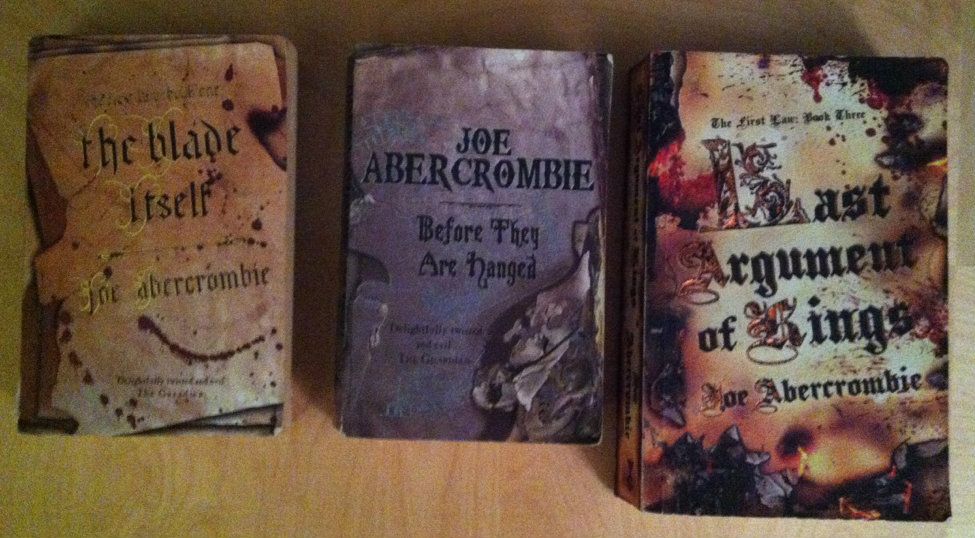Or why you should read The First Law Trilogy and
semi-Sequels by Joe Abercrombie.
When I was in highschool (grades 8-12), I was pretty into
the Fantasy genre of books. I had exhausted the supply of easy and moderately
difficult to find Star Wars expanded universe novels and was looking for
another epic and very geeky genre of books to read. I found that in Fantasy
novels. Oddly enough, I think my first Fantasy Novels were a trilogy by Chris
Claremont (of all people), which were imaginative, adventurous, and just that
little bit sexier than a Star Wars novel. I later got me into some R A
Salvatore, some Ed Greenwood, some Margaret Weis and Tracy Hickman. I loved the
Dragon Crown War Cycle of novels by Michael A Stackpole (the author of my
favourite Star Wars books), and still love them with the fires of nostalgia. I
tackled The Lord of The Rings, and struggled through its (as I felt then)
detached storytelling while still acknowledging its brilliance and influence. I
read a lot of objectively terrible D&D tie-in novels in several universes.
I did not read Harry Potter.
Eventually though, my love affair with Fantasy waned. Part
of it was the rapidly decreasing stock of unread fantasy novels at my library.
Another part was that fantasy novels, particularly of the D&D spin-off ilk,
had repetitive plots that were mostly just subtle variations of Tolkienian fiction
which when it’s all you read gets pretty stale. The final nail in the coffin
for me as a prolific fantasy reader was that most of the books I was reading
were not particularly well written, and as I matured and gained other reading
experiences, I started to want more sophisticated fiction. Of course, this also
coincided with me rediscovering more literary and mature Science Fiction novels
that wanted to discuss big ideas about society while still having awesome
adventures and thrilling plots.
The net result was that I more or less stopped reading
Fantasy novels, with a few remarkable exceptions: those few Fantasy novels that
deliver well written, mature stories that, thematically, explore larger
concepts.
Joe Abercrombie’s novels are just such exceptional Fantasy
novels.
On The First Law Trilogy.
The First Law Trilogy, Abercrombie's debut novels, are essentially his take on Tolkienesque epic fantasy, with a genre appropriate amount of swords, sorcery and journeying. The story follows a thoughtful barbarian with a bloody past, Logen Ninefingers, a self centered nobleman fop, Jezal dan Luthar, and a crippled torturer, Sand dan Glotka as they, and their world, are embroiled in a war started centuries before by a schism between the Order of the Magi and the legendary Master Maker. So in a broad strokes way epically epic fantasy.
Except it's kind of not.
The key difference between The First Law Trilogy and other post-Tolkien epic fantasy, besides it's superbly crafted prose and it's fantastically vibrant characters, is that these novels add a layer of moral ambiguity to the Tolkien equation. Where most epic fantasy tends to boil down to good-verses-evil with clear, black-and-white distinctions, Abercrombie's novels exist in a much more murky and complex moral structure: no faction or character is completely good and no faction or character is completely wicked and where even the worst atrocities can be rationalized. This adds a layer of maturity to the story that is often lacking in Fantasy novels and makes for some truly shocking and thought provoking moments.
The first law trilogy also differentiates itself by its deconstructionist approach to the genre. Abercrombie is fully aware of the hero’s journey narrative structure and while he superficially crafts his novels around it, he gleefully and frequently subverts it. Beyond being a great way to generate plot twists, Abercrombie’s subversive breaks from genre conventions outline what makes Fantasy tick and really emphasizes how much a Fantasy audience relies on these genre conventions to inform their understanding of the narrative. Or at least to predict the shape of the story. While the moral ambiguity makes for a more mature and nuanced story, this deconstructionist aspect of the story adds an element of genre analysis to the Trilogy: what is Fantasy and how do we define it as a reader. It’s smart stuff.
Of course, when trying to
convince friends to give The First Law Trilogy a try, saying things like
“Fantasy deconstruction” and “challenging conventions by introducing
immorality” don’t typically get people super excited. Instead I point out how
funny these books are. Joe Abercrombie, despite the aforementioned academic
aspects of his books, is a man who doesn’t take himself too seriously. His books
are fully willing to acknowledge their internal absurdity and to basically
satirize fantasy. Abercrombie is also adept at throwing a lot of jokes into
his work, although, keeping with the morally challenging nature of the novels,
a lot of the jokes approach gallows humour. Very funny, pretty dark. Still, one
of the more funny series of books I’ve read, and easily the funniest Epic
Fantasy series.
In a nutshell I’d say The
First Law Trilogy is a mature, intelligent, and humourous take on the Epic
Fantasy genre that manages to tell an exciting story with amazingly realized
characters.
Okay, I want to discuss
his other novels, but this is already kind of long… So I’ll continue it after
the cut.
